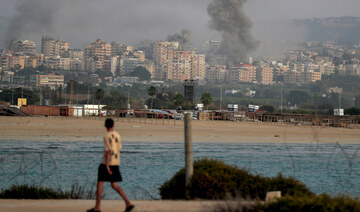NEW YORK: Arab nations and various other groups at the UN have urged the world body’s Security Council — at a proposed emergency meeting on Thursday — to condemn the “provocative” visit of newly appointed Israeli National Security Minister Itamar Ben-Gvir’s visit to Al-Aqsa Mosque compound in East Jerusalem on Tuesday.
Palestine’s permanent representative to the UN, Riyadh Mansour, told Arab News on Wednesday that there was widespread support for action to be taken against the far-right minister and Israel.
Mansour said the groups were united in condemning actions that violated international law and the status of Jerusalem, Al-Aqsa Mosque and Al-Haram Al-Sharif. He was speaking in the wake of a long day of meetings on Wednesday that saw over 50 delegations from various committees and international groups express support for Palestine at the UN headquarters in New York.
Ben-Gvir’s visit to the Al-Aqsa Mosque compound has enraged Palestinians and spurred worldwide condemnation amid warnings about Israeli plans to change the status quo of the holy sites.
What Saudi Arabia has called a “provocative action” has mobilized diplomats across the UN missions in New York. On Wednesday, there was a meeting of the council of Arab ambassadors to the UN, followed by the council of ambassadors of the OIC, or the Organization of Islamic Cooperation.
Then 20 ambassadors representing the Arab Group at the UN held a meeting led by Mansour whose country holds the rotating presidency of the group for January. They were joined by the troika of the Non-Aligned Movement, and delegations from the OIC and the Committee on the Exercise of the Inalienable Rights of the Palestinian People.
The flurry of activity was ahead of the proposed emergency Security Council meeting which was requested by Palestine and Jordan and supported by Security Council member the UAE, as well as China, France and new member Malta.
Mansour told Arab News: “You see that within the span of 48 hours the international community is reacting strongly and in a unified way against (this) fascist member of the Israeli cabinet Ben-Gvir.
“And to show, from the beginning of this government, that the international community will not tolerate, not accept, and will condemn and reject such steps which are in violation of international law and in violation of the historic status quo as it relates to the holy sites — the Islamic and the Christian sites in Jerusalem, particularly Al-Aqsa Mosque and Al-Haram Al-Sharif.”
Ben-Gvir, a far-right politician convicted of anti-Arab incitement in 2007, was appointed national security minister in Benyamin Netanyahu’s new coalition government, with expanded powers over Israel’s police. He has long called for Jewish prayer at Al-Aqsa, which has been the site of several conflagrations in the past between Israelis and Palestinians.
Hamas fought an 11-day war with Israel in 2021 after weeks of escalating clashes at Al-Aqsa. What is known as the Second Intifada also erupted after an inflammatory visit to the site in 2000 by the late Ariel Sharon, then leader of the opposition.
“The state of Palestine and the Palestinian people are so grateful for this massive support,” said Mansour outside the Security Council chamber where he was flanked by over 20 ambassadors from the Arab world and elsewhere, including Saudi Arabia’s permanent representative to the UN, Abdulrahman Al-Wasil.
“Almost all countries in all corners of the world are saying that the international community is the party to decide the fate of the two-state solution,” said Mansour. “It is the international community that decides the fate of defending and protecting the historic status quo in Jerusalem in defense of the Islamic and Christian sites in Jerusalem.”
The attack is not only against Islam’s holy sites, Mansour said, adding that Israeli extremists are also now a threat to “our Christian sites, Christian graveyards (that) are being trampled upon by extremist settlers. This is a toxic environment. The international community has to speak in one voice in rejecting this extremism, those fascist elements in the Israeli government.”
Beautiful statements, he said, would not suffice at the Security Council meeting. “We want implementation in a concrete way. We want this behavior not to be repeated, and we want a guarantee of honoring and respecting the historic status quo in deeds and not only in words.”
In his letter to the Security Council requesting the emergency meeting, Mansour called on the international community to act urgently to halt “the impending explosion of the situation in … Occupied Palestine and the grave threats it poses to international peace and security.”
Mansour urged the Security Council to “unequivocally condemn these illegal and dangerous actions and demand that Israel (cease) its violations and assaults on this holy site and fully comply with its obligations under international law.
“It is incumbent on the Security Council to remind Israel that it is the occupying power and has no sovereignty rights whatsoever in Occupied Palestine.
“The Security Council has the opportunity to act now to set the tone for this new year that the violation of international law and human rights will not be tolerated and that there will be accountability and consequences for the perpetrators.”
Ben-Gvir’s visit took place as tensions have mounted again between Israelis and Palestinians in the West Bank, with the past year the deadliest for Palestinians in the territory since the end of the Second Intifada.

























